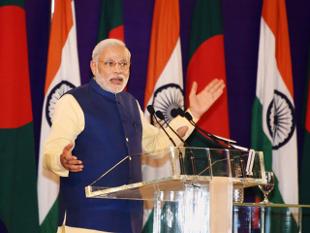Discussion on allowing Foreign Universities in India

Prime Minister Narendra Modi has
summoned a meeting of top bureaucrats to discuss the feasibility of allowing
foreign universities to set up campuses in India. Modi has called for a special
meeting on June 11 at his 7 Race Course Road residence to discuss the subject,
which the commerce ministry thinks has the potential to position India as an
Asian hub for higher education and also help the country save foreign exchange.
It will be attended by the cabinet
secretary, the head of the Niti Aayog, the foreign secretary, secretary in the
Department of Expenditure, HRD ministry secretary and the chairman of
University Grants Commission.
An increasing number of students have been opting to go
overseas for undergraduate and post-graduate studies in recent years, partly
also because of the difficulty in getting admissions to top colleges of their
choice. A vast majority of them also choose to work and settle abroad, in the
process depriving the country of its best brains. This also the costs the
country precious foreign exchange as studying abroad is not cheap.
According to the UNESCO Institute of Statistics, around
200,000 students from India went to study overseas in 2012, bestowing the country
the status of having the second-largest population of socalled "mobile
students" after China. China sent almost 700,000 students to study
overseas that year.
Although the BJP had opposed the UPA's plans to open up India's education sector to foreign universities, the Modi government decided to revisit the issue. This was spearheaded by the commerce ministry which held its first meeting to discuss the issue in January this year.
Recognition of online degrees abroad, improving infrastructural capacity to offer online courses, encouraging leading Indian institutes to set up campuses abroad, new parameters for ranking and accreditation, removal of procedural hurdles and participation in global trade promotional events were some of the highlights of the broad strategy.
"Global trade in higher education is a growing
sector. We have a number of strengths including cost advantage and good number
of English speaking professionals. Our geographical location makes India a
viable destination for Asian students. This potential should be tapped.
Inviting foreign universities to operate here is one of the ways to attract
international students," said a commerce ministry source privy to the
discussions held in January.
The Foreign Educational Institutions Bill, which failed
to pass political muster during the UPA-II, was opposed tooth and nail by the
opposition parties including the BJP, Left and the Samajwadi Party.
Faced with political opposition in enacting the law, the
HRD ministry had in September 2013 decided to take the executive order route to
open the doors for the top 400 institutions to set up campuses in the country
and award degrees. The regulations, however, were never issued with the
government's legislative department failing to notify them. So there is at
present no legal and regulatory framework to allow foreign universities to set
up campus in India.
Source : http://economictimes.indiatimes.com/
Post Your Comments for this News
Foreign Studies Articles
-
SSC Result 2017 - SSC Results 2017 Bangladesh
2017-04-27 05:20:13
-
Why should you choose a pioneer immigration consultant for your international study needs?
2017-04-10 12:26:42
-
How studying abroad can help you to change the world?
2017-04-03 09:58:36
-
Vital Steps For Studying Abroad
2016-12-07 12:21:06
-
Guide to Study abroad in Canada
2016-10-14 17:39:22

